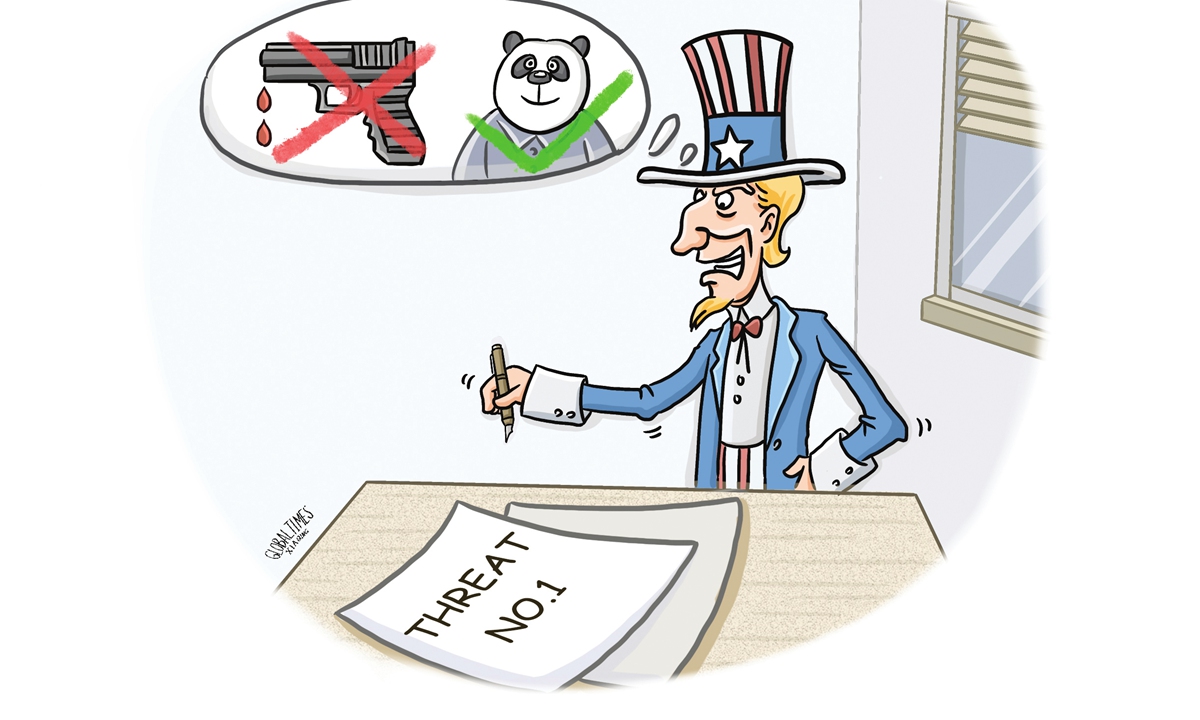To Washington: Don’t let fear of China prevail

Illustration: Xia Qing/Global Times
People are eagerly anticipating the arrival of peace in the New Year because it is still something that the world lacks.
The term "peace" has two meanings in English: One refers to safety and freedom from war and violence, while the other pertains to a state of tranquility, devoid of worry, problems, noise, or unwanted disturbances.
I once engaged in a discussion about the meaning of the word "peace" with an American scholar. He pointed out that what the word "peace" means to Chinese is quite different to what it means to Americans, particularly those who identify as Christians and place great emphasis on achieving peace of mind. In my opinion, these two meanings are intricately connected and cannot be separated.
The opposite of peace is fear, and an excessive amount of fear often jeopardizes and destroys peace. Wars may erupt because of excessive fear. Terrorism, characterized by groups that instill fear, sow terror, and propagate hatred through brutal acts, often involves the senseless murder of innocent civilians, an act that is unfathomable to the average person.
Fear is also an important factor in the psychological composition of the US strategy against China. In recent years, the "China threat" has become a theme that has been intensified by some politicians in Washington.
Is China really that terrifying? Washington repeatedly emphasizes the need to win in competition with China. No one knows what Washington's ultimate goal of victory is; not even American politicians can explain it clearly. However, the so-called victory is evolving toward a dangerous direction of treating China as an enemy and trying to defeat it. How strong must the fear be to create such a national strategy?
I wonder why no politician with an ounce of wisdom has ever stood up and said, "The goal is wrong, it is impossible to achieve."
Pursuing and creating peace is a remedy for addressing fear, both for the international community and for a nation. However, first and foremost, one must know what truly deserves to be feared.
On Tuesday morning, I learned from American media about a shooting incident that took place during a New Year's Eve gathering in Los Angeles, which resulted in two deaths and eight injuries. In 2023, the number of mass shootings in the US has once again risen. According to statistics from the Gun Violence Archive website, there were more than 650 mass shootings in the US in 2023.
This is a real pain point that makes Americans live in fear.
One of the reasons why Americans are not as fearful of gun violence but instead have a great fear of China's rise is the continuous exaggeration by politicians and the media, fostering the availability bias in behavioral psychology.
When judgment of risk is swayed by emotions, anxiety is continually intensified due to a lack of confidence, and fear is constantly amplified for personal political needs. As a consequence, comprehensive and objective assessment of the current situation, the nature of the crisis, the degree of danger, and controllability will no longer be possible. The resulting decisions and their social effects will turn anxiety into extreme fear, ultimately leading to a shift in strategic focus and a risk of losing control.
Incorrect strategic goals cannot achieve inner peace. Instead, they often wear down sensitivity to pain, exacerbating danger in the numbness.
As the New Year begins, Chinese people prefer to look ahead, which doesn't mean forgetting the past but rather seeking genuine tranquility with a broader mindset.
The renowned Chinese literary figure Su Shi of the Song Dynasty (960 - 1279) wrote a famous poem titled "Calming the Waves." On the occasion of the New Year, many Chinese people recite this poem in short videos to express a broad-mindedness that transcends the ups and downs of life. From this, one can also understand how the Chinese people view the China-US relationship. I would like to provide the first two lines of this poem to the policymakers in Washington: Listen not to the rain beating against the trees. Why don't you slowly walk and chant with ease?
The author is a senior editor with the People's Daily, and currently a senior fellow with the Chongyang Institute for Financial Studies at Renmin University of China. dinggang@globaltimes.com.cn. Follow him on X @dinggangchina


